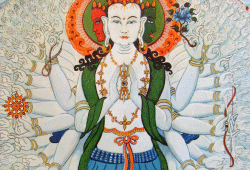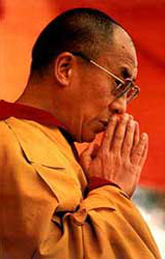  |
|
|
At the age of two he was recognized as the reincarnation of the 13th Dalai Lama, Thubten Gyatso. The Dalai Lamas are believed to be manifestations of Chenrezig (or Avalokiteshvara), the Bodhisattva of Compassion and patron saint of Tibet. Bodhisattvas are enlightened beings who have postponed their own nirvana and chosen to take rebirth in order to serve humanity. His Holiness began his monastic education at the age of six. At 23 he sat for his final examination in the Jokhang Temple in Lhasa. He passed with honours and was awarded the Geshe Lharampa degree, a degree equivalent to a doctorate of Buddhist philosophy. In 1950 the Dalai Lama was called upon to assume full political power after China's invasion of Tibet in 1949. In 1954, he went to Beijing for peace talks with Mao Zedong and other Chinese leaders but in 1959, with the brutal suppression of the Tibetan national uprising in Lhasa by Chinese troops, His Holiness was forced to escape into exile. Since then he has been living in Dharamsala in northern India, the seat of the Tibetan political administration in exile. His Holiness the Dalai Lama is a man of peace. In 1989 he was awarded the Nobel Peace Prize for his non-violent struggle for the liberation of Tibet. He has consistently advocated policies of non-violence, even in the face of extreme aggression. Since 1959 he has received countless awards, honorary doctorates, prizes, etc., in recognition of his message of peace, non-violence, inter-religious understanding, universal responsibility and compassion. He has been a consistent advocate for global environmental concerns. His Holiness has also authored more than 72 books. The Dalai Lama has travelled to more than 62 countries spanning six continents. He has met with presidents, prime ministers and crowned rulers of major nations. He has held dialogues with the heads of different religions and many well-known scientists. He describes himself as "a simple Buddhist monk".
Quotes "In the practice of tolerance, one's enemy is the best teacher." "Love and compassion are necessities, not luxuries. Without them humanity cannot survive." "My religion is very simple. My religion is kindness." "Our prime purpose in this life is to help others. And if you can't help them, at least don't hurt them." "The purpose of our lives is to be happy." "There is no need for temples, no need for complicated philosophies. My brain and my heart are my temples; my philosophy is kindness." "My religion is simple. There is no need for temples; no need for complicated philosophy. Our own brain, our own heart is our temple; the philosophy is kindness." "Today, more than ever before, life must be characterized by a sense of universal responsibility, not only nation-to-nation and human-to-human, but also human-to-other forms of life." "Whether one believes in a religion or not, and whether one believes in rebirth or not, there isn't anyone who doesn't appreciate kindness and compassion."
Links The Office of His Holiness XIV Dalai Lama: http://www.dalailama.com Tibetan Government in Exile official website: http://www.tibet.com From the Wikipedia: http://en.wikipedia.org/wiki/Dalai_Lama HHDL's 1989 Nobel Peace Prize acceptance speech: http://nobelprize.org/nobel_prizes/peace/laureates/1989/lama-acceptance.html CNN.com Indepth Special: http://www.cnn.com/SPECIALS/2001/dalai.lama The Dalai Lama Foundation: http://www.dalailamafoundation.org/members/en/index.jsp
|
|
The Chenrezig Project Snohomish County WA; Central Florida Tel: (206) 707-9944 info@chenrezigproject.org © 2006, 2015. The Chenrezig Project. All rights reserved. |
 His Holiness the 14th Dalai Lama, Tenzin Gyatso, is both the head of state and the spiritual leader of Tibet. He was born to a farming family, in a small hamlet located in (Amdo) northeastern Tibet.
His Holiness the 14th Dalai Lama, Tenzin Gyatso, is both the head of state and the spiritual leader of Tibet. He was born to a farming family, in a small hamlet located in (Amdo) northeastern Tibet.